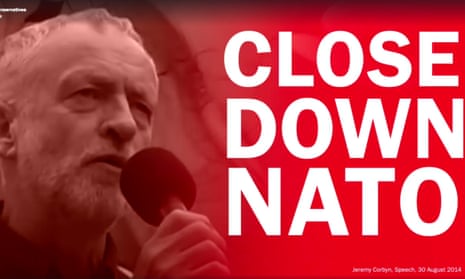Conservative HQ has launched a wave of digital attack adverts targeting Jeremy Corbyn into voters’ Facebook feeds, a snapshot of the opening stages of the online election campaign reveals.
Labour’s response meanwhile largely avoids mention of its party leader, according to a sample of more than 77 adverts sent out by party HQs to over 2,000 Facebook users that have been collected by a new initiative called Who Targets Me.
The two main parties are expected to spend well over £1m between them during the 2017 general election by exploiting Facebook’s ability to target specific voter groups with tailored messaging.
The rise of Facebook, which now has some 32m accounts in the UK, has empowered campaigners to experiment with video, beyond the strict limits of the traditional televised party election broadcasts. The ability to splice together TV footage and post it to Facebook streams within hours of an event is bringing to Britain elements of the “attack ad” culture previously more prevalent in the US.
In contrast with billboards or TV broadcasts, such campaigning has hitherto been hard to track because of its semi-private nature. Who Targets Me is asking voters to sign up and become part of a nationwide project to map the phenomenon. So far over 4,000 volunteers have signed up across nearly 600 constituencies.
The Conservatives appear convinced of Corbyn’s value in their own Facebook ads and attack him directly in 10 out of 10 of the ads sent from Conservative Central Office. Nine out of 10 contrast him unfavourably with May, who is typically rendered in colour while Corbyn is in monochrome.
The mostly widely seen Conservative post so far among the Who Targets Me volunteers has been a video of Labour voters telling the BBC’s Daily Politics show that they are planning to vote for May because they object to Corbyn. It appears to be part of the Tory tactic of targeting Labour voters in key marginals and has been viewed more than 221,000 times.
A 17-second video that has had 204,000 views, pits a speech by May saying the Conservatives are “always committed to a strong national defence and supporting the finest armed forces known to man” against two edited together clips of Corbyn saying: “Close down Nato” and then: “Wouldn’t it be wonderful if every politician around the world did what the people of Costa Rica have done and abolished their army.”
This article includes content provided by Facebook. We ask for your permission before anything is loaded, as they may be using cookies and other technologies. To view this content, click 'Allow and continue'.
Another ad simply states: “A vote for Labour is a vote for Jeremy Corbyn.”Labour has said it will match the Conservatives on social media spending this year. Robert Blackie, a digital campaign expert who has previously advised the Liberal Democrats, has estimated spending rates on Facebook in this election could already be running at around £140,000 a week. At the last election, Labour only spent £160,000 on social media advertising compared with £1.2m by the Conservatives, according to the Electoral Commission.
Only two out of 14 ads heavily used by Labour on Facebook and picked up by Who Targets Me volunteers so far make any mention of Corbyn, according to the snapshot, which the Guardian analysed with the Bureau of Investigative Journalism.
In one instance, a 2min 45sec video fronted by the actress Maxine Peake about how a Labour government would change Britain mentions the leader for under five seconds. Most other Labour ads sent out to Facebook users focus solely on policies such as opposing a return to fox-hunting or urging people to register to vote before the 22 May deadline.
However, there were signs the strategy might be shifting after a high-profile week for Corbyn following the leak of Labour’s manifesto. The most regularly received advert so far in the sample was an edited video of Corbyn’s campaign launch speech set to swelling string music sent out on Thursday. It has been viewed over 1m times, although not all of those will have been a result of paid-for advertising.
Labour is using an in-house system called Promote to target different adverts at different voter groups. It was trialled on Sadiq Khan’s mayoral campaign.
“It is open to local campaign teams so for example if they are vying for a seat served by Southern rail, they can target voters with our message about bringing the railways back into public ownership,” said a Labour source. He added Labour has so far tested 1,200 different iterations of Facebook adverts on voters.
The Liberal Democrats appear to have been more prolific than both of the main parties so far in producing adverts through Facebook with 44 different adverts already tracked by Who Targets Me.
One of the most popular, with 243,000 views is a video contrasting Tim Farron’s long and animated discussion with angry pro-Brexit voter Malcolm Baker in Kidlington with Theresa May’s Team blocking reporters from asking questions and shutting some reporters in a room on a factory tour in Cornwall.
However, there is yet to be any clear evidence of the kind of microtargetting of individual voters based on sophisticated psychometric profiling of Facebook users, of the kind claimed by companies like Cambridge Analytica, which advised the Leave.EU Brexit campaign.
“Much more tailored ads may come but so far we are not seeing that,” said Sam Jeffers, a former digital campaigning adviser to Labour who has set up Who Targets Me. “I will be surprised if we see anything as sophisticated as Cambridge Analytica are talking about. There is a resource problem around coming up with lots of different ad treatments and there is no good way of automating that.”
